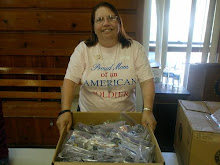State denies Marine recognition because of how he died
Marine Lance Cpl. Darrell Schumann, a 25-year-old
from Hampton, fought bloody door-to-door battles for three months in Fallujah in late 2004. A few weeks later, he boarded a helicopter for the first leg of his trip home.
The helicopter, carrying Schumann and 30 comrades, flew into
a sandstorm and crashed in the Iraqi desert, killing everyone on board. It remains the greatest single loss of U.S. troops in the Iraq war.
President Bush praised Schumann by name for his valor. But his name will not be found on the Virginia War Memorial in Richmond.
State officials have deemed that only the names of service members killed in hostile combat in the Middle East will be added to the stone-and-glass walls, which bear the names
of 11,600 Virginians killed since World War II.
Recent veterans who died under other circumstances, such as aircraft accidents, are excluded.
The policy has changed since the memorial was erected, and the names of many service members who were killed in accidents are found on the wall.
Rick Schumann, Darrell's father, wants the policy changed again.
The memorial will soon undergo an $8 million expansion, funded mostly by taxpayers.
"We want them to do it right," Schumann said.
The state relies on the Defense Department's classification of deaths: killed in action, hostile casualty or nonhostile casualty. To be included on the Virginia memorial, a service member must fall into one of the first two categories.
According to a Virginian-Pilot review of Department of Defense records, at least two dozen service members with Virginia roots died in accidents (Read more...)
Wednesday, November 12, 2008
Virginia disrespecting Military again
Monday, October 27, 2008
Attorney General: count all absentee military ballots
Absentee ballots from overseas military voters lacking the name and address of a witness must be counted, according to a formal opinion from Attorney General Bob McDonnell.
The opinion affirms that federal law preempts state law, a news release from McDonnell’s office says.
At issue is a state requirement that the completed federal ballot provide the name and address of a witness to the absentee vote – unless the voter has also requested a separate, state-furnished ballot. The federal form, used for voting in all 50 states, does not provide a space for the address and does not specify which states, such as Virginia, require it.
If the Virginia law were upheld, it threatened to invalidate some of the thousands of absentee votes being cast by military members and other Virginians overseas.
The federal write-in absentee ballot is most commonly used by members of the military who are stationed overseas and have not received a state absentee ballot, the Attorney General’s news (Read more...)
Saturday, October 25, 2008
Law Threatens Thousands of Military Votes
********************************
The Fairfax County Registrar—and possibly other Registrars in Virginia—is rejecting most Federal Write-in Absentee Ballots (FWAB) cast by our men and women in uniform.
The FWAB is a federally mandated write-in ballot that allows military servicemembers and their dependents to cast an absentee ballot when they have
not received a ballot before the election. It is a safety net that allows a servicemember to vote even if the mail truck hasn't reached his or her remote
base in Iraq or Afghanistan in time to cast a regular absentee ballot.
Why is the Fairfax Registrar rejecting these ballots? The Registrar states that the witness who signs the envelope containing the FWAB must include his or her address—but most of the ballots don't include the witness' address.
Virginia law does not require a witness address for any other type of absentee ballot. So, for example, a Virginia resident attending college out of state does not need to include her witness' address on her absentee ballot envelope. But the Fairfax County Registrar is holding servicemembers, including those currently defending their country in war zones, to a much more exacting standard, requiring the witnesses who sign their FWABs to include their address.
To make matters worse, the Federal form (SF-186A) that is used for the FWAB
does not have a space for witnesses to include their address. And the Department
of Defense's official Voting Assistance Guide, which it provides to servicemembers as an instruction manual for casting votes while overseas, does not tell servicemembers that they must include an address for their witness. The servicemember would thus have no way of knowing of this requirement.
Federal law does not allow this type of disparate treatment of servicemembers. The Uniform and Overseas Citizens Absentee Voter Act (UOCAVA), 42 U.S.C. § 1973ff-2, requires states to process FWABs "in the manner provided by law for absentee ballots in the State involved." (emphasis added). In other words, the FWAB must be treated like any other absentee ballot under state law and may not be subject to more restrictive requirements. Yet that is precisely what is being done here.
Express your feelings to the state directly:Virginia State Board of Elections
Suite 101, 200 North 9th Street,
Richmond,Virginia 23219-3485
Telephone: 804 864-8901
Toll Free: 800 552-9745
FAX: 804 371-0194
Also read here...http://www. military. com/news/article/law-threatens-thousands-of-military-votes. html?col=1186032310810
GO! NOW! This cannot stand. Thank you.




